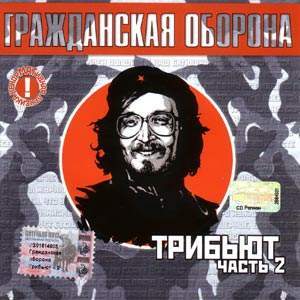Let’s try something different: a Sociological Songs Special, completely focusing on a single band. And the band is Grazhdanskaya Oborona (Гражданская Оборона, “Civil Defense” in Russian), a landmark USSR punk number from the 1980s [1]. Now I know what you think. But please, suspend your disbelief. The former Soviet Union had, despite repression, a flourishing punk scene. Just have a look at this picture gallery of retro-crested, mirror-shaded, pin-pierced vodka-drinking rockers. Then we’ll talk. And as we are talking, please also have a look at this impressive media archive, where you can download an incredible amount of original recordings, bootlegs, and pictures.

As legend has it, Grazhdanskaya Oborona was the mindchild of Yegor Letov (1964-2008), the self-styled “psychedelic” poet and musician from Omsk, Siberia. Letov always had a talent for controversy. Which might explain why he started his career as an anarchist under a communist regime and ended up, after the fall of the Berlin wall, founding the National Bolshevik Party, a right-wing/left-wing (?) political organization whose symbol is everything but unequivocal. But this is a story for another time…
Like for many other punk bands, Grazhdanskaya Oborona’s songs were a mix of hard rock, noise, ska (sometimes), and unbecoming lyrics. A good example is probably the ironical (and definitely NSFW) винтовка – это праздник (The rifle, what a party)
The rifle – what a party! It fucks up everything!
The rifle – what a party! It fucks up everything!
The rifle – what a party! It fucks up everything!
The rifle – what a party! It fucks up everything!The seeds of anarchy grow luxuriant.
This system is corroded by social gonorrhea.
The front of madness is going global,
There won’t mercy for anyone – anyone, anyone.
Or take this other one for instance, the signature я не верю в анархию (I don’t believe in Anarchy), here in a rare 1988 live performance.
I don’t believe in anarchy!
I don’t believe in anarchy!
I don’t believe in anarchy!
I don’t believe in anarchy!Who doesn’t like the new order?
Who doesn’t believe in the new order?
Who is not eager for the new order?
Who is building a new order?
Now, isn’t the self-contradictory nature of the title statement reminescent of Niklas Luhman’s “Paradox of Nihilism” (as expressed in The Modernity of Science)? Outdistancing oneself from any kind of political belief turns out to be a constraining political belief in itself. Which is why the song goes “This is not anarchy – this is fascism” – and this is probably why, provocatively, Letov was later involved with the aforementioned National Bolsheviks: looks like for him the side-effect of not believing in anything was the possibility of believing in whatever…
From many points of view, Grazhdanskaya Oborona was just an archetypal punk thing. But some characteristics were idiosyncratically Russian: the ambiguous play with symbols of Soviet power, the penchant for rustic folk melodies, and of course the fact that for almost a decade their concerts ended up with the secret police unplugging the instruments and arresting band members and audience. (If you follow this blog, and you read a bit of French, you might recall that back in the 1980s this style was influential way outside the Russian borders, for instance as far West as in Italy). Their seminal albums were recorded and distributed illegally via copied magnetic tapes: it was the so-called magnitizdat network. Or, given the poor quality of the surviving recordings, we should say “de-magnitizdat”. The song that best epitomizes all this, is probably the sarcastic (and catchy) Всё идёт по плану (Everything is going according to plan), a melody that is sung still nowadays at Russian parties, get-togethers or whenever there’s a guitar around.
Well, when we get communism it’ll all be fucking great.
It will come soon, we just have to wait.
Everything will be free there, everything will be far out.
We’ll probably not even have to die.
I woke up in the middle of the night and realizedThat everything is going according to plan.
Everything is going according to plan.
This song has so many sociological ramifications that, instead of pointing you to a single book, I’d rather associate it to the work of Russian dissident Aleksandr Zinovyev. The song could score so many of his “social novels” and books, from Homo Sovieticus (1982), to Catastroika (1988), The Russian Experiment (1994) or The Ideology of the Party of the Future (2003).
Repression was, for Grazhdanskaya Oborona or for fellow Soviet-era punk bands, a reality. In several interviews Letov elaborates about their arrests, confiscations of equipment and threats by KGB officers. The song Мы лед под ногами майора (We are the ice under Major’s feet) is inspired by one of them.
They do not know what is pain.
They do not know what is death.
They do not know what is the fear of standing alone in worm-eaten walls.
The Major will strangle them all,
One by one.
Here he comes, but he falls – there is ice and
We are ice under Major’s feet!
This song was included in their 1987 album Тоталитаризм (Totalitarianism), so, as far as sociological references go, I think this is a good chance to rub the dust off Hannah Arendt’s classic, pertinently titled The Origins of Totalitarianism (Elemente und Ursprünge totaler Herrschaft, 1951).
Ok, I think that’s enough for one day. To finish our little excursus, here’s a classic anti-war ballad, Солдатами не рождаются (One is not born a soldier). And to go with it, I would like to suggest an interesting text: “We Have Bare Hands: Nonviolent Social Movements in the Soviet Bloc”, by Lee Smithey and Lester R. Kurt. It was published in 1999 as a chapter in the book Nonviolent Social Movements, edited by Stephen Zunes, Lester R. Kurtz, and Sarah Beth Asher and published by Blackwell Publishers, in Cambridge, Massachusetts .
After all, one is not born a soldier:
One dies as a soldier.
[